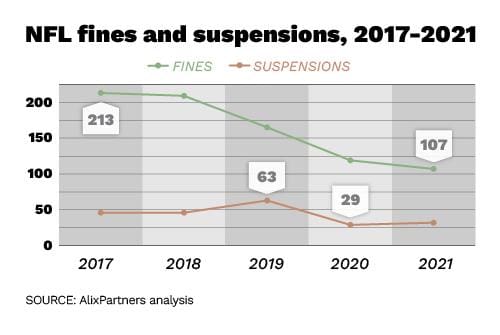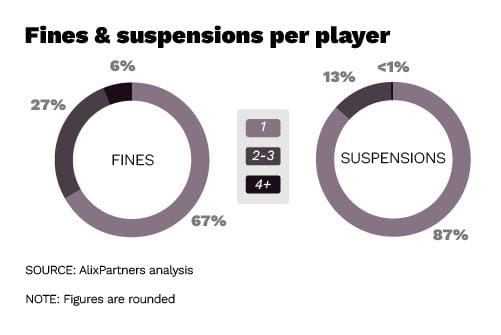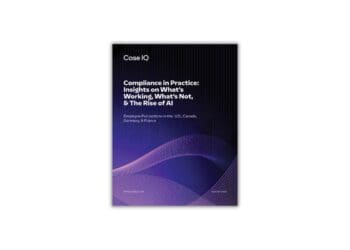Cheering for your favorite team (or against the one you hate), makes it easy to forget that NFL players are employees. If they violate team or league rules and regulations, they can be fined or even suspended. But suspensions do more than just create chaos in your fantasy football season; they speak to the effectiveness of the NFL’s compliance program. David Bligh of AlixPartners has crunched the numbers to determine whether the NFL’s disciplinary policies are working — and what lessons compliance teams in more traditional fields can take.
The NFL’s 103rd season kicks off this week, and most fans are filled with optimism for their teams’ chances of winning a Super Bowl. There is, however, another reason for a positive outlook: The league has experienced a downward trend in suspensions and fines since 2017, suggesting that the NFL’s disciplinary programs are effectively disincentivizing players from violating its rules and regulations. How can companies take this data and apply it to their compliance programs?
We analyzed the data the NFL publicizes about player infractions and resulting disciplinary actions to identify potential insights and lessons for companies seeking to evaluate or enhance the design of their compliance programs.
Per the DOJ’s “Evaluation of Corporate Compliance Programs,” a hallmark of an effective compliance program is the establishment of incentives for compliance and disincentives for noncompliance. The DOJ highlights certain elements of these incentives and disciplinary measures including:
- Whether the company has clear disciplinary procedures that are enforced consistently and in a manner commensurate with the violations.
- Whether the company adequately communicates its position on noncompliant conduct.
The DOJ provides examples, including companies that publicize disciplinary actions internally and others that provide incentives (e.g., bonuses, promotions, or rewards) for demonstrating ethical leadership.
For those keeping score, the NFL checks many of the DOJ’s boxes: Its rules and the penalties for violating them are generally well-defined and publicly available, it honors players for having a positive effect on the community and and unlike most companies, it publicizes employee disciplinary actions for all eyes to see.
Digging into the data
We analyzed player fine and suspension data for all regular season NFL games between 2017 and 2021 from several sources to identify trends by season, team, player and week.
Between the 2017 and 2021 seasons, the total number of fines across the league nearly shrunk in half and the average fine amount decreased by more than 30%. The number of suspensions decreased by more than half over the same period.
 (A spike in suspensions during the 2019 season was partially connected to a melee during a Week 11 Steelers-Browns game that resulted in three players being suspended and 30 being fined. Because of the high number of fines issued for this single incident, we excluded that data from our analysis of team- and league-wide fines but included the suspension data.)
(A spike in suspensions during the 2019 season was partially connected to a melee during a Week 11 Steelers-Browns game that resulted in three players being suspended and 30 being fined. Because of the high number of fines issued for this single incident, we excluded that data from our analysis of team- and league-wide fines but included the suspension data.)
The New England Patriots, tied for the most Super Bowl wins with six, also tied with the Tampa Bay Buccaneers for the lowest number of fines per season. Perhaps relatedly, those two teams have appeared in or won two of the past five Super Bowls.
From a corporate perspective, this raises a chicken-and-the-egg-type question: Do successful companies attract and retain more compliant employees or are companies successful because their employees are more compliant?
Across the league, we also observed that the number of fines per game over the past five seasons decreased, on average, by approximately 40% from the first week of the season to the last. This trend raises some valuable considerations for companies as they think through their own programs:
- Are players rusty at the beginning of each season when it comes to adhering to rules and regulations? How can companies ensure that employees returning from periods of leave (e.g., sabbaticals, parental leave or boomerang hires) are reminded of their companies’ expectations of them?
- Does this trend indicate that players could be mentally resetting at the beginning of the season, assuming they have a clean slate? If companies analogized a season to an employee performance period, how would companies ensure that their own employees take a long-term view when it comes to compliance?
- Rookie players accounted for only 5% of all Week 1 fines. This could be the result of many factors, including more recent training, fewer opportunities (due to fewer rookie starters) or simply by behaving better given more tenuous roles on their teams. Regardless of the reason, these scenarios all pose important questions for companies, including how are new employees eased into “starting” roles, how do companies keep veteran employees apprised of their policies and how do companies incentivize veteran employees to be as compliance conscious as new ones?
 What lessons can companies learn from the NFL’s suspensions?
What lessons can companies learn from the NFL’s suspensions?
There were no obvious trends in the suspension data by season or team. On a player level, however, there was one statistic that appeared quite convincing: Of the players who received a suspension, only about 13% were suspended more than once during the five-year period — a remarkably low rate of recidivism. Employment laws aside, should corporations rely more heavily on suspensions as a penalty and deterrent for noncompliance?
The rate of repeat fines is higher — about 27% of fined players received at least one more, while 6% were assessed at least three more fines, including one player (cornerback Marcus Peters), who was fined nine times over five years. The NFL’s system of fines does not appear to have been as effective of a deterrent as its suspensions. Corporations would be wise to calibrate their disciplinary programs to increase the likelihood of their effectiveness, though a major caveat applies here: NFL players make considerably more money than the average worker or even the average executive in the U.S., so monetary penalties may simply be less of a hit for them.
How do incentives play into the NFL’s compliance program?
In addition to discouraging bad behavior by assessing fines and suspensions, the NFL also offers incentives for good behavior.
The league’s Walter Payton Man of the Year Award, for example, encourages players to make a positive impact on the community through philanthropy and civic engagement, and the annual award winner receives a $250,000 donation to the charity of their choice. Nominees’ charities receive smaller donations. The donation to the organization the player supports (rather than directly to the player) cleverly mitigates the risk of wrongdoing to achieve the incentive.
We analyzed data from the nominees and winners to determine the effectiveness of this particular incentive program. Of the 160 nominees over the past five seasons, five received suspensions and 21 were fined a total of 24 times in the year they were nominated. Further, one award winner received two fines in his winning season, including one for unsportsmanlike conduct.
We certainly don’t debate the worthiness of the nominees or the winners, but companies seeking to establish or revise compliance incentives should carefully ensure that, just like disciplinary actions, the criteria are clearly defined and applied consistently.
What can companies take away from this?
There is no one-size-fits-all approach when it comes to incentives and disciplinary measures, but here are the most important takeaways from our analysis:
- Behavior will not change overnight, but consistency is key. Over the past five years, the NFL has seen a noticeable drop in fines in suspensions but not without some obstacles along the way. Over time and with consistent application, an effectively designed system of incentives and disciplinary measures should result in better employee behavior.
- Penalties and incentives should be calibrated. Fines in the NFL do not appear to be as effective a deterrent as suspensions, which may be because the cost of a fine does not outweigh the benefit to the player who violates the rule. Companies should be cognizant that employees view potential disciplinary consequences as a significant cost to them.
- Think creatively. We applaud the creative way in which the NFL incentivizes compliance through donations made on behalf of all Walter Payton Man of the Year Award nominees. Not every incentive needs to be monetary — companies should understand what their employees value to better design their compliance incentives.
- Success and compliance go hand-in-hand. While we cannot be certain, the data seems quite clear that more compliant teams are generally more successful.



 David Bligh is a director at AlixPartners. He has nearly 15 years of experience assisting clients with their accounting and compliance needs, including monitorships, investigations and restatements. He guides his clients through reporting to and negotiations with the SEC and DOJ. Dave is a Certified Public Accountant, a Certified Fraud Examiner and Certified Compliance and Ethics Professional. Dave holds a Bachelor of Science degree in Business Administration with honors in accounting and management from the University of Richmond. Prior to his career at AlixPartners, he conducted integrated financial statement audits as a senior auditor at a Big Four public accounting firm.
David Bligh is a director at AlixPartners. He has nearly 15 years of experience assisting clients with their accounting and compliance needs, including monitorships, investigations and restatements. He guides his clients through reporting to and negotiations with the SEC and DOJ. Dave is a Certified Public Accountant, a Certified Fraud Examiner and Certified Compliance and Ethics Professional. Dave holds a Bachelor of Science degree in Business Administration with honors in accounting and management from the University of Richmond. Prior to his career at AlixPartners, he conducted integrated financial statement audits as a senior auditor at a Big Four public accounting firm. 








